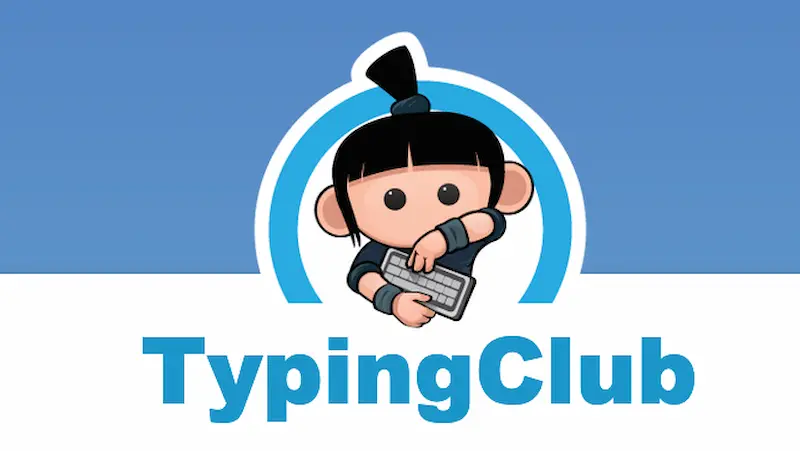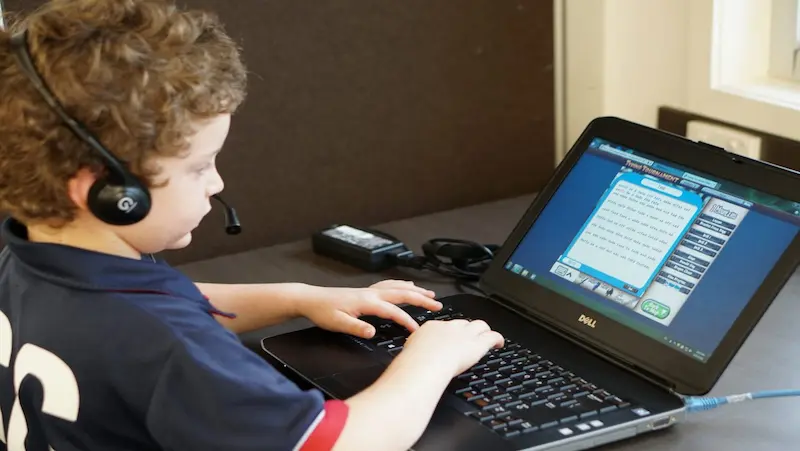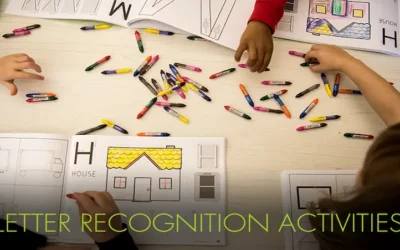In today’s digital age, typing has become an essential skill that children must possess. Gone are the days when writing by hand was the primary mode of communication and information sharing. With the advent of computers, laptops, tablets, and smartphones, the ability to type quickly and accurately has become a fundamental requirement.
Developing proficient typing skills is not only beneficial for school assignments and projects but also essential for future academic and professional success. In this article, we will briefly explain the importance of developing typing skills in kids, highlighting the advantages it offers in various aspects of their lives.
Table of contents
Benefits of Typing Games for Kids
In today’s digital age, where technology plays a significant role in our lives, it is essential to equip children with the necessary skills to thrive in a rapidly evolving world. One such skill is typing, which has become an integral part of communication and productivity. Playing a coding game for kids can be a stimulating and enjoyable way for young learners to explore the world of programming, fostering creativity and problem-solving abilities in the process.
Traditional typing methods can be monotonous for kids, but typing games offer a refreshing and enjoyable approach to learning. In this blog, we will explore the benefits of typing games for kids, focusing on how they can improve cognitive abilities and hand-eye coordination while making learning an engaging experience.

Enhancing Cognitive Abilities:
Improved Focus and Attention: Typing games require children to concentrate on the screen, observe the keys, and react swiftly. By practicing these games regularly, kids develop enhanced focus and attention skills, which can transfer to other areas of their lives, such as academics and problem-solving.
Enhanced Memory and Recall: Many typing games incorporate memory challenges, where kids need to remember sequences of letters or words. By engaging in these games, children exercise their memory and recall abilities, which can be beneficial in various learning situations.
Increased Typing Speed and Accuracy: Typing games often feature time constraints and accuracy goals, encouraging kids to type faster and more accurately. Regular practice with these games can help children develop muscle memory, allowing them to type effortlessly and efficiently. This skill can prove invaluable as they progress through their education and professional lives.
Improving Hand-Eye Coordination:
Refined Motor Skills: Typing games require children to use their fingers to navigate the keyboard while simultaneously tracking the on-screen action. This enhances their hand-eye coordination and fine motor skills. As they become proficient in typing, their finger dexterity and accuracy will improve, benefiting other activities that require precise hand movements.
Multi-tasking Abilities: Typing games often present multiple challenges simultaneously, such as tracking moving targets or avoiding obstacles while typing. Engaging in these games helps kids develop the ability to multitask effectively, which can be advantageous in various real-life situations where juggling multiple tasks is required.
Age-Appropriate Typing Games
In today’s digital world, typing has become an essential skill for people of all ages. Whether it’s for school assignments, work tasks, or simply communicating with others, typing proficiency is crucial.
Also, Solving riddles for kids can be a delightful and engaging way to stimulate their critical thinking skills and keep them entertained while expanding their knowledge.
However, learning to type can often be a daunting task, especially for younger children. That’s where age-appropriate typing games come into play! These interactive and engaging games not only make typing practice enjoyable but also help develop essential keyboarding skills.
In this blog, we’ll categorize typing games based on different age groups, ensuring that learners of all ages can find suitable options.

Preschool and Early Elementary (Ages 3-6):
For young children who are just starting their typing journey, it’s crucial to introduce them to typing games that are fun, easy to understand, and visually appealing. Homeschooling for preschool provides an opportunity for parents to customize their child’s early education, creating a nurturing and tailored learning environment to promote a strong foundation for future academic success. Here are a few suggestions:
a) Keyboard Zoo: This game features colorful animals that children can help by typing the letters they need. It teaches basic letter recognition and hand-eye coordination.
b) Dance Mat Typing: Created by the BBC, Dance Mat Typing introduces kids to touch typing through animated characters and catchy songs. It gradually introduces new keys and finger positions, making it a great choice for early learners.
Upper Elementary (Ages 7-10):
As children progress through their elementary years, they can handle slightly more complex typing games that focus on accuracy and speed. Here are some options for this age group:
a) Typing Club: Typing Club offers comprehensive typing lessons with interactive exercises. It provides a structured curriculum, allowing students to progress at their own pace while building their typing skills.
b) Nitro Type: This game combines typing practice with racing. Players compete against others by typing quickly and accurately to boost their car’s speed. It’s a thrilling way to improve typing speed and accuracy.
Middle School and High School (Ages 11-18):
As students enter their teenage years, typing games can be more challenging and geared towards practical applications. Here are a couple of recommendations:
a) Typing.com: With a variety of lessons, tests, and games, Typing.com offers a comprehensive typing curriculum suitable for middle school and high school students. It includes real-world typing exercises, such as typing articles or emails, to simulate real-life scenarios.
b) TypeRacer: TypeRacer is a multiplayer game that allows students to compete against others in typing races. It challenges them to type accurately and swiftly, improving their typing speed and accuracy under pressure.
How Typing Games Enhance Learning
In today’s digital age, typing has become an essential skill for students, professionals, and individuals from all walks of life. As technology continues to evolve, the ability to type quickly and accurately has become increasingly important. Integrating typing games into lego robotics for kids can enhance their learning experience, as it not only reinforces their programming skills but also improves their typing proficiency, making them well-rounded learners.
While traditional typing exercises can be monotonous, typing games offer an engaging and interactive alternative that not only makes learning enjoyable but also enhances learning outcomes. In this blog post, we will explore specific ways in which typing games can boost learning and provide a range of benefits.

Increased Typing Speed:
Typing games are designed to improve typing speed through repetitive practice. By engaging in these games, learners are encouraged to type quickly and accurately to achieve their objectives. As they progress through different levels, they develop muscle memory, hand-eye coordination, and finger dexterity.
With regular practice, learners can significantly increase their typing speed, which has a direct impact on productivity in various tasks involving written communication.
Enhanced Accuracy:
Typing games not only focus on speed but also emphasize accuracy. Through gameplay, learners are challenged to type correctly while under time pressure. This constant practice improves their ability to hit the right keys without errors.
By honing their accuracy skills, learners become more efficient in their written communication, reducing the need for time-consuming proofreading and editing.
Improved Focus and Concentration:
Typing games often involve fast-paced gameplay and require players to concentrate on multiple elements simultaneously. This helps learners develop focus and concentration skills, which are transferable to other areas of learning.
The ability to maintain attention and concentrate on tasks for extended periods is crucial in academic and professional settings, where distractions can hinder productivity.
Reinforcement of Language and Vocabulary Skills:
Many typing games incorporate language and vocabulary exercises, making them an excellent tool for language learners or individuals looking to expand their vocabulary. These games often include word puzzles, spelling challenges, and grammar exercises, which reinforce language skills while also improving typing proficiency.
By combining typing practice with language learning, learners can simultaneously enhance their written communication and language abilities.
Motivation and Engagement:
Typing games provide a gamified approach to learning, making the process enjoyable and engaging. The element of competition, achievement-based rewards, and progress tracking motivate learners to continue practicing and improving their typing skills.
The interactive and visually appealing nature of these games holds learners’ attention and encourages them to invest more time in the learning process. As a result, learners are more likely to stay motivated, leading to better learning outcomes.
Transferable Skill Development:
The skills acquired through typing games are transferable to various domains. Rapid and accurate typing skills are valuable in academic settings, professional environments, and personal pursuits. Investing time and effort in developing strong parenting skills can have a profound impact on a child’s growth and well-being, creating a nurturing and supportive environment for their overall development.
Whether it’s taking notes, writing essays, creating documents, or engaging in online communication, the ability to type quickly and accurately significantly enhances productivity and efficiency.
Top Free Typing Games for Kids
In today’s digital age, being proficient in typing has become an essential skill for children. Whether they’re typing school assignments, communicating with friends, or exploring the vast world of technology, having good typing skills can greatly enhance their productivity and efficiency. Also, Coding games for kids offer a playful and interactive way to introduce them to the world of programming, nurturing their problem-solving abilities and igniting a passion for technology from an early age.
Luckily, learning to type can be enjoyable too, thanks to the availability of numerous free typing games online. In this article, we will explore and review some of the most popular free typing games for kids, ensuring they have a blast while improving their keyboard proficiency.

“Dance Mat Typing”:
Developed by the BBC, “Dance Mat Typing” is a fantastic interactive typing game suitable for children of all ages. The game features colorful characters and engaging animations, making it a captivating experience. It is divided into levels, each focusing on different rows of the keyboard.
With its progressive difficulty, “Dance Mat Typing” allows kids to gradually master the keyboard and build their typing skills.
“Typing Club”:
“Typing Club” is an excellent typing game designed to cater to both beginners and more advanced typists. It offers a structured curriculum with lessons and exercises that cover various typing techniques.
The game provides instant feedback and tracks the user’s progress, allowing children to identify areas where they need improvement. With its user-friendly interface and comprehensive lessons, “Typing Club” is an ideal choice for kids looking to enhance their typing skills.
“Nitro Type”:
If your child loves racing games, “Nitro Type” is a perfect blend of racing excitement and typing practice. In this multiplayer game, players participate in high-speed races by typing words as quickly and accurately as possible.
They can compete against other players in real-time, join teams, and earn virtual currency to customize their vehicles. “Nitro Type” adds an element of competition to typing practice, motivating kids to improve their speed and accuracy. Engaging in age-appropriate computer games for kids can not only be a source of entertainment but also a means to enhance their cognitive skills and digital literacy in today’s technology-driven world.
“Typing.com”:
“Typing.com” is a comprehensive typing platform that offers a variety of typing lessons, games, and activities. It includes a vast collection of lessons suitable for different skill levels, allowing children to progress at their own pace.
The platform offers a friendly and intuitive interface, making it easy for kids to navigate. With its interactive games and typing challenges, “Typing.com” keeps young learners engaged while honing their typing skills.
“TypeRacer”:
“TypeRacer” combines the thrill of racing with typing exercises. Players compete against others in a virtual race, typing words and phrases accurately and swiftly to progress. The game supports multiple languages and offers a range of race modes, including practice races and tournaments.
With its lively community and leaderboard system, “TypeRacer” creates a fun and competitive environment for kids to improve their typing speed and accuracy.
Tips for Parents
In today’s digital age, typing has become an essential skill for children to master. Whether it’s for school assignments, future job prospects, or simply effective communication, the ability to type efficiently is crucial. Enrolling in parenting classes can provide valuable guidance and support to parents, equipping them with essential skills to navigate the challenges of raising children and fostering a positive family environment.
As a parent, you play a vital role in encouraging and supporting your child’s typing practice. In this blog, we will discuss some practical tips and strategies to help you guide your child on their journey to becoming a proficient typist.

Create a conducive learning environment:
To foster your child’s typing skills, ensure they have a comfortable and distraction-free workspace. Set up a designated area with an ergonomic keyboard and chair, and eliminate any potential distractions such as noisy surroundings or cluttered spaces. A calm and organized environment will enhance your child’s focus and concentration during typing practice. Encouraging positive thinking for kids can empower them with the ability to approach challenges with optimism and resilience, fostering a healthy mindset for personal growth and happiness.
Start with proper finger placement:
Teaching your child the correct finger placement on the keyboard is essential. Encourage them to use all ten fingers, with the left hand resting on the ASDF keys and the right hand on the JKL; keys. This technique, known as touch typing, will help them build muscle memory and improve their typing speed over time.
Utilize engaging typing software:
Make typing practice fun and engaging by utilizing various typing software and games designed specifically for children. These programs often incorporate interactive exercises, lessons, and typing challenges that cater to different age groups and skill levels. Some popular typing software includes “TypingClub,” “TypeTastic!,” and “Nitro Type.”
Set achievable goals:
Help your child set realistic and achievable goals for their typing practice. Break down the learning process into smaller milestones and celebrate their achievements along the way. This approach not only boosts their motivation but also provides a sense of accomplishment as they progress. Encourage them to practice regularly but avoid putting undue pressure or strict timelines.
Practice with engaging content:
Introduce your child to typing practice through content that interests them. Encourage them to type short stories, articles, or passages from their favorite books. This approach not only keeps them engaged but also helps improve their typing accuracy and speed while expanding their vocabulary and comprehension skills.
Monitor posture and ergonomics:
Proper posture and ergonomics are crucial for long-term typing comfort and avoiding musculoskeletal issues. Teach your child to sit upright, with their feet flat on the floor and their wrists in a neutral position while typing. Encourage breaks and stretching exercises to prevent strain on their hands, wrists, and back.
Lead by example:
Children often learn by observing their parents’ behaviors. Demonstrate good typing habits by practicing touch typing yourself. Show them the importance of accuracy and efficiency in your own typing tasks. By being a positive role model, you can inspire your child to take their typing practice seriously and develop good habits from an early age.
Encourage practice beyond school assignments:
While typing practice is typically integrated into school assignments, encourage your child to practice typing outside of their academic requirements. Encourage them to type emails, chat with friends or family, and explore other activities that require typing. The more they practice, the more comfortable and proficient they will become.
Conclusion
In conclusion, typing games have proven to be a valuable educational tool for kids, offering numerous benefits that can enhance their typing skills and overall cognitive development. Through engaging and interactive gameplay, these games effectively teach children the fundamentals of typing while keeping them entertained.
Firstly, typing games improve typing speed and accuracy. By providing a fun and engaging platform, kids are motivated to practice and refine their typing skills, leading to faster and more accurate typing abilities. This is a crucial skill in today’s digital age, where efficient and accurate typing is essential for academic and professional success. Also, With the availability of robotics for kids online, children can now explore the fascinating world of robotics from the comfort of their homes, gaining valuable STEM skills while having fun.
Secondly, typing games enhance hand-eye coordination and fine motor skills. As children navigate through various levels and challenges in typing games, they improve their hand-eye coordination by accurately hitting the right keys on the keyboard. This, in turn, strengthens their fine motor skills, contributing to their overall dexterity and precision.
As parents, it is crucial to encourage our children to explore the options available in the realm of typing games. There is a wide range of games specifically designed for different age groups and skill levels. By providing access to these games, we can actively support our children’s learning journey and help them develop essential typing skills that will serve them well throughout their lives.
In conclusion, typing games offer a multitude of benefits for kids. They improve typing speed and accuracy, enhance hand-eye coordination and fine motor skills, promote language proficiency, and foster problem-solving and critical thinking abilities.
By exploring the available options, parents can provide their children with an enjoyable and effective way to develop crucial typing skills. So, let’s encourage our kids to embark on this exciting typing adventure and watch them thrive in the digital world.
BrightChamps offers financial literacy games for kids that emphasize the importance of money and provide an engaging way to learn about finances. Through our interactive platform, children can develop essential money management skills while having fun and gaining valuable knowledge for their future financial well-being.
Discover the extraordinary learning journey that awaits your child at BrightChamps. Our pioneering edutech company offers a transformative blend of robotic adventures, financial education, and coding mastery for kids. By nurturing curiosity, instilling financial literacy, and fostering technological prowess, BrightChamps equips young learners with the tools they need to thrive in an ever-evolving world.
Frequently Asked Questions
A1: Typing games help kids develop essential keyboarding skills while making learning fun.
A2: Typing games improve children’s typing speed, accuracy, hand-eye coordination, and computer literacy.
A3: Yes, typing games can be enjoyed by kids of all age groups, from preschoolers to teenagers.
A4: Yes, typing games can enhance your child’s school performance by improving their typing skills, which are increasingly important in the digital age.
A5: Yes, there are many free typing games available online specifically designed for kids to enjoy and practice their typing skills.


























